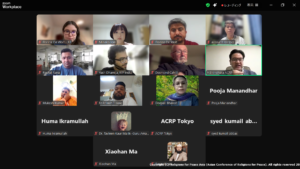 November 12, 2024- FPCC program coordinators (Religions for Peace, UNICEF and Joint Learning Initiative on Faith & Local Communities) held an online seminar on “Drivers and Barriers to Routine Immunization for Children Under Five and COVID-19 Among Religious Communities”.
November 12, 2024- FPCC program coordinators (Religions for Peace, UNICEF and Joint Learning Initiative on Faith & Local Communities) held an online seminar on “Drivers and Barriers to Routine Immunization for Children Under Five and COVID-19 Among Religious Communities”.
This is a brief report on what was discussed during the webinar.
Religious Communities and Vaccination Barriers
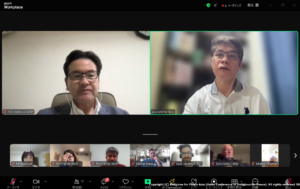 Rev. Dr. Yoshinori Shinohara, Secretary-General of Religions for Peace Asia, emphasized the significant role religious communities play in addressing social challenges, including promoting vaccinations and improving children’s healthcare. He highlighted findings from a study on barriers to vaccination in South Asia, such as misinformation and mistrust in healthcare systems. Florine De Wolf (Joint Learning Initiative on Faith & Local Communities) presented insights from a mobile survey conducted by UNICEF and JLI across 10 countries, including Nepal and Pakistan, with nearly 20,000 respondents. The survey revealed key barriers to vaccination, such as limited information and lack of trust in healthcare providers.
Rev. Dr. Yoshinori Shinohara, Secretary-General of Religions for Peace Asia, emphasized the significant role religious communities play in addressing social challenges, including promoting vaccinations and improving children’s healthcare. He highlighted findings from a study on barriers to vaccination in South Asia, such as misinformation and mistrust in healthcare systems. Florine De Wolf (Joint Learning Initiative on Faith & Local Communities) presented insights from a mobile survey conducted by UNICEF and JLI across 10 countries, including Nepal and Pakistan, with nearly 20,000 respondents. The survey revealed key barriers to vaccination, such as limited information and lack of trust in healthcare providers.
The Influence of Religious Leaders on Vaccination
Religious leaders have a profound impact on vaccination decisions. Data presented by Florine revealed that in Pakistan, 27% of respondents were influenced by seeing a religious leader receive a COVID-19 vaccine. In Nepal, health workers were the most influential in encouraging vaccinations. In Pakistan, 59% of parents believed that most religious leaders supported child vaccinations. A latent class analysis categorized respondents into three groups:
- Supporters of vaccination who believe religious leaders also support it.
- Supporters of vaccination who think religious leaders oppose it.
- Non-supporters of vaccination who believe religious leaders also oppose it.
Drivers and Barriers to Immunization
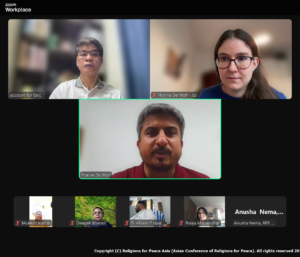 Florine presented findings from qualitative research conducted between 2022 and 2023 in Kenya, Pakistan, and Brazil under the FPCC initiative. The study found that while most religious beliefs do not prohibit vaccination, anti-vaccine sentiments are sometimes justified using religious reasoning. Charismatic leaders often drive these sentiments, underscoring the need for collaboration between religious leaders and healthcare institutions to improve vaccination rates.
Florine presented findings from qualitative research conducted between 2022 and 2023 in Kenya, Pakistan, and Brazil under the FPCC initiative. The study found that while most religious beliefs do not prohibit vaccination, anti-vaccine sentiments are sometimes justified using religious reasoning. Charismatic leaders often drive these sentiments, underscoring the need for collaboration between religious leaders and healthcare institutions to improve vaccination rates.
Engaging Religious Communities through Effective Communication
Effective communication is essential to engage religious communities and address vaccine hesitancy. Social media was identified as a critical tool for disseminating accurate information. Florine shared success stories, such as religious leaders publicly advocating for vaccination, but acknowledged persistent myths and conspiracy theories in some communities. Strengthening education and communication infrastructure is vital for long-term impact.
Recommendations for Overcoming Barriers
The workshop proposed strategies to bridge gaps between religious communities, governments, and development partners:
- Develop integrated communication channels combining evidence-based messaging with religious teachings.
- Build long-term partnerships with religious leaders to foster trust and influence.
- Share tools like prevention toolkits and faith-based guidelines across networks.
The Role of Religious Leaders in Public Health
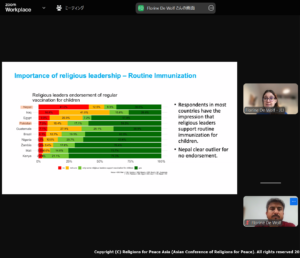 Discussions emphasized the powerful influence of religious leaders in public health campaigns. Examples from Pakistan showcased how religious leaders boosted COVID-19 vaccination rates through advocacy and community engagement. Grassroots-level efforts and collaboration between faith leaders, governments, and NGOs were identified as crucial to addressing vaccine hesitancy effectively.
Discussions emphasized the powerful influence of religious leaders in public health campaigns. Examples from Pakistan showcased how religious leaders boosted COVID-19 vaccination rates through advocacy and community engagement. Grassroots-level efforts and collaboration between faith leaders, governments, and NGOs were identified as crucial to addressing vaccine hesitancy effectively.
Faith Guidance on Immunization Strategies
A “Faith Guidance on Immunization” document was introduced, covering key areas such as:
- Understanding immunization from a faith perspective.
- Effective communication strategies.
- Promoting vaccination through dialogue and education.
- Monitoring and evaluation of immunization initiatives.
Suggestions included publishing articles in religious community publications and engaging faith leaders in building vaccine confidence and dispelling myths.
Looking Ahead
Participants emphasized the need for sustained collaboration and shared success stories to inspire action. By leveraging the influence of religious communities and their leaders, we can overcome barriers to vaccination and ensure healthier, more resilient communities worldwide.
This workshop underscored that faith communities are not just allies but essential partners in global public health initiatives.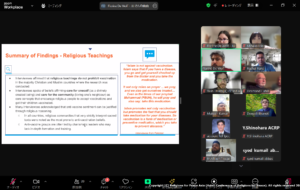
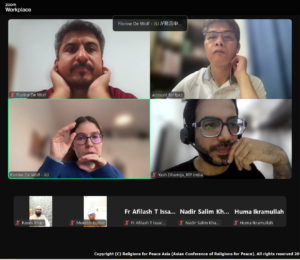
Reported by Religions for Peace Asia Secretariat
